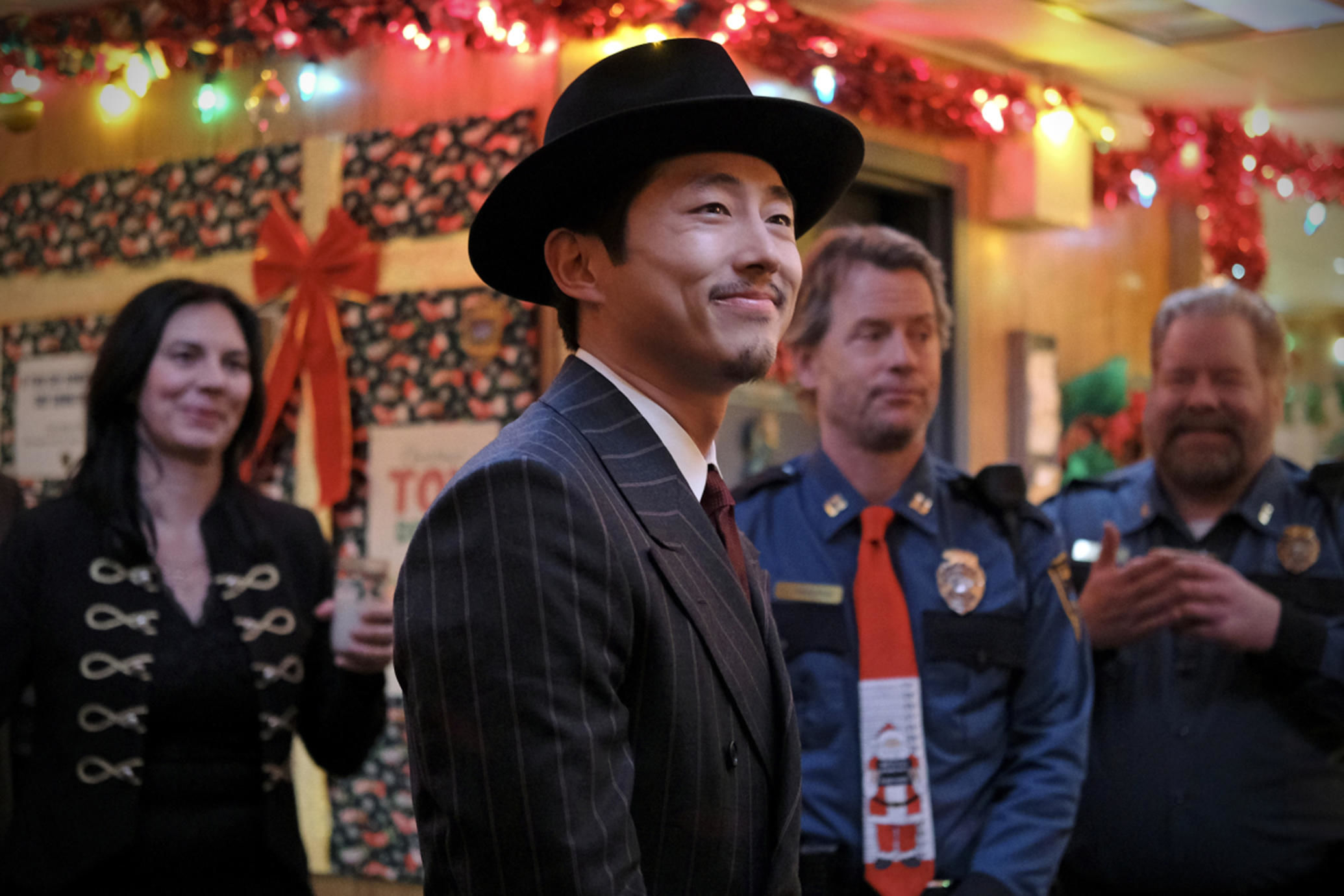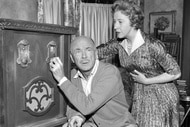Create a free profile to get unlimited access to exclusive videos, sweepstakes, and more!
Executive producer Glen Morgan explains the politics of the new Twilight Zone

In the fourth episode of the new The Twilight Zone, Steven Yeun stars as the eponymous "A Traveler," a man who seems to be a thrill-seeking tourist but is, in fact, probably an alien. Then again, whether or not Yeun's character is a bad guy, a good guy, or an invading extraterrestrial really depends on your interpretation of the episode itself. Throughout the episode, A Traveler infiltrates a Christmas party and manipulates an Alaskan cop named Yuka (Marika Sila) into essentially giving him complete access to Earth. The densely layered script tackles issues of colonialism, and opportunism, against the backdrop of a classic sci-fi story of paranoia.
Written by Glen Morgan — a writer and producer on the original X-Files — this latest entry into The Twilight Zone is perhaps the eeriest and most subtle of Jordan Peele's take on the new series so far. SYFY WIRE caught up with Morgan to discuss the intricacies of the episode, and also how his role as an executive producer on the new Twilight Zone has shaped the series.
Pretend I'm an idiot. What does the ending of your new episode "A Traveler" mean?
I don't want to ruin your interpretation. But the theme that runs through it is the theme for the entire season. What's real? What's actually happening? What's the truth and what's a lie? Most of us [who write] The Twilight Zone lean left, and I think we notice when those who don't are lying. But this episode is about what happens with someone on our side — it shouldn't be said that way — but what happens when we lie? You shouldn't believe a lie even if it benefits your side. In this case, Yuka is used because of her willingness to believe the lie.
How did you get involved in the new Twilight Zone?
I was walking down the street, minding my own business, when I got a phone call from Grace Gilroy, and I'd worked with her before. She produced the most recent X-Files reboots and asked me if I wanted to be part of [The Twilight Zone]. I was supposed to be on a few weeks as a consultant, and that ballooned and I hung around.
In an anthology show, I'm not sure I have a sense for what an executive producer does, exactly. Can you make that clear? Are you talking to Jordan Peele regularly? Do you recruit writers?
On a first-year series — even on a serialized show — there's so much finding your way. When I worked on the anthology series Lore for Amazon, it was insane, because one week you were in Germany in 1582, and the next week in Washington in 1944. At least with Twilight Zone, it's all the same time period.
When I first started on Twilight Zone, Jordan was still filming Us, and along with him and the other producers, we mostly brainstormed topics we thought would be good for the new Twilight Zone — we would talk about an issue in the world that we wanted to do a story around. Which is what the old Twilight Zones did. And that's how we found our way. So every week was sort of a different journey for me as the executive producer.
So, was there ever a point where you, or Jordan Peele, or anyone else decided to do remakes of old episodes? Were remakes basically off the table? I mean, the Adam Scott episode has a similar title ...
We never wanted to do remakes. When you look at the great episodes of The Twilight Zone, there's usually a twist. But not all episodes of the old Twilight Zone have a twist. People tend to remember the twists, rightfully so. And everyone remembers the monsters and the twists, but when you really look at it, Rod Serling had been a successful and great writer and wanted to do dramas. And he was doing social issues that he could hide in a sci-fi/fantasy/horror genre. So, to me, the social issues of the time — bigotry, technology, greed — these things were always the staple of what made The Twilight Zone great. And that was our first approach.
Is this version of The Twilight Zone overtly political?
Not always. There are some episodes where you'll understand our point of view. But we have an episode coming later that's about a gun. And we worked really hard to make sure that the left wouldn't turn it off right away, but that the NRA wouldn't either.
But that's what's so great about the original Twilight Zone, you don't do it by being heavy-handed. You ask yourself, "Is that me?"
New episodes of The Twilight Zone are airing every Thursday on CBS All Access.














